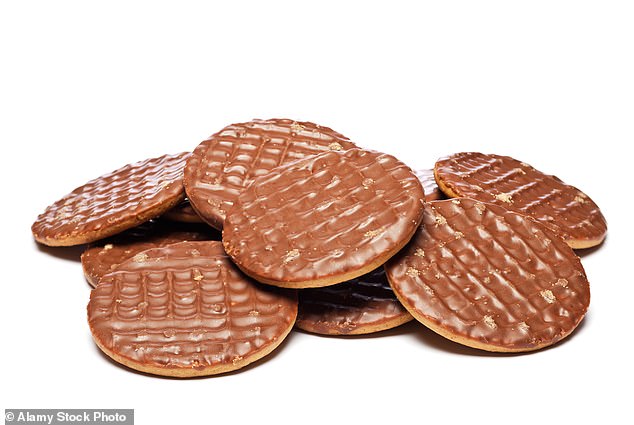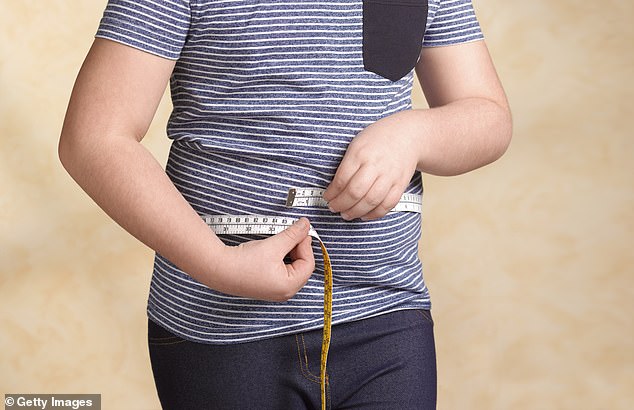A new ‘nanny state’ ban on junk food advertising online and on TV before 9pm will cut just TWO calories a day from children’s diets – equivalent to less than a tenth of a jelly baby
A new ban on junk food advertising on TV and online will remove just two calories a day from children’s diets – equivalent to less than a tenth of a jelly baby.
Ministers will today introduce legislation to curb advertising, despite acknowledging it could cost businesses £199 million a year while having a marginal impact on diets.
The policy aims to reduce children’s exposure to foods high in fat, sugar or salt, such as cakes, biscuits, ready meals and chips.
The law will come into effect from October next year and will apply at all times to advertising on television before the 9pm watershed and on the internet.
Companies will also be banned from promoting junk food outdoors, for example on billboards.
According to the government’s impact assessment, the measures are likely to reduce children’s exposure to such advertisements by just 8.9 seconds and remove 2.1 calories from their diet each day.
All told, the Department of Health and Social Care says this could prevent 20,000 cases of childhood obesity. However, the impact assessment shows that the actual benefits may be less. Young people can make up for the calorie deficit by eating more, as adults and advertisers could lose £659m over 25 years.
Officials will also publish today a detailed list of the foods and drinks covered by the ban.
A new ban on junk food advertising on TV and online will remove just two calories a day from children’s diets – equivalent to less than a tenth of a jelly baby

Health Secretary Wes Streeting said: ‘Obesity is robbing our children of the best possible start in life, setting them up for a lifetime of health problems, and costing the NHS billions. This government is now taking action to put an end to the targeting of junk food advertisements at children, both on TV and online.
It includes prepared soft drinks with added sugar; savory snacks; cereals and porridges; chocolates and candies; ice cream, popsicles, frozen yogurt and pastries.
Advertisements for sweet cookies and bars based on nuts, seeds or grains will also be restricted, as will advertisements for morning products, including sweet pastries and sweetened bread products; desserts and puddings; sweetened yogurt and cottage cheese; pizzas; prepared potato products; and ready-made meals and sandwiches.
Health Secretary Wes Streeting said: ‘Obesity is robbing our children of the best possible start in life, setting them up for a lifetime of health problems, and costing the NHS billions. This government is taking action now to put an end to the targeting of junk food ads to children, both on television and online.”
NHS data shows a trend of increasing childhood obesity, with almost one in ten reception-age children (9.2 percent) now living with obesity and one in five by the age of five (23.7 percent) affected by tooth decay.
Professor Sir Stephen Powis, National Medical Director of the NHS, said: ‘We have always said that the NHS can play a role in supporting people who are obese to achieve a healthier weight, but we need to work with the rest of society work together to prevent people from becoming obese. being overweight in the first place. So we welcome this proposed legislation and look forward to working with the Government and partners to help protect the good health of future generations.”
It is said that children with obesity are more likely to live with the condition as adults and are at significantly greater risk of life-limiting diseases.
Obesity is the second biggest preventable cause of cancer, according to health experts, costs the UK healthcare system more than £11 billion every year and is a major contributor to poor health, preventing people from fully participating in work.

Ads for sweet cookies and bars based on nuts, seeds or grains will also be restricted (stock image)

It is said that children with obesity are more likely to live with the condition as adults and are at significantly greater risk of life-limiting diseases. The advertising ban is intended to reduce children’s exposure to foods high in fat, sugar or salt (file image)
Chris Snowdon, head of lifestyle economics at the Institute for Economic Affairs, said: ‘The ban on food advertising has no global precedent, so Britain is in uncharted territory, but I predict it will not lead to a reduction in obesity. Every other policy to combat obesity has failed, including the sugar tax and mandatory calorie labeling, and I see no reason why this will be any different.
‘It is bad news for broadcasters, internet platforms and for everyone who uses them. If obesity rates have not fallen in five years, the ban must be repealed and serious questions must be asked of the pressure groups that pushed for it.”
A spokesperson for the Advertising Association said: ‘The Government’s own impact assessment makes it clear that the impact of this policy on daily calorie reduction for the average child will be minimal at best, while potentially costing the UK advertising sector millions of pounds, with implications for the creative industries and the UK creative industries. broader economic growth.
‘We urge the government to implement holistic policies proven to tackle the true causes of obesity, such as socio-economic disadvantage, and public health campaigns can play an important role.’
